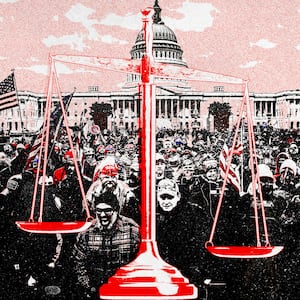A white supremacist dubbed the “Crying Nazi” is causing chaos at the Unite the Right trial, hijacking the proceedings to press his personal conspiracies about antifa.
Midway through neo-Nazi Christopher Cantwell’s contentious appearance in court on Monday, a lawyer interrupted with an objection.
“I understand he is pro se,” attorney Alex Conlon said, referring to the fact that Cantwell is representing himself, “but this is not a podcast.”
Cantwell—who does indeed host a podcast—is among more than a dozen far-right figures being sued this month for their alleged roles in orchestrating violence at Unite The Right, the deadly 2017 white supremacist rally in Charlottesville, Virginia. Some of those defendants, including Cantwell, are representing themselves in court, after being dropped by their attorneys. That means Cantwell—who earned the nickname the “Crying Nazi” after video emerged of him blubbering ahead of his arrest—and co-defendant Richard Spencer have been able to speak at length during the trial, leading to chaotic outbursts.
Already, Spencer has confused two famous Black authors, while Cantwell has relitigated old conspiracy theories and used the n-word.
Unite the Right—advertised as something like Woodstock ‘99 for fascists—saw a coalition of white supremacists descend on Charlottesville on Aug. 11 and 12, 2017. The event was marked by violence from its outset, with participants attacking counter-demonstrators during a torch-lit march the first night. The rally culminated in murder, after neo-Nazi James Fields Jr. drove his car into a crowd of counter-demonstrators on Aug. 12, killing one and wounding dozens more.
The far right began circulating conspiracy theories about the attack moments after it occurred, first claiming the driver was a leftist, then blaming victims for the hit-and-run. (Fields was convicted of murder and is currently serving 30 life sentences.) Plaintiffs in the Charlottesville lawsuit, which is being brought by the group Integrity First for America, argue that rally organizers bear responsibility for the attacks.
Cantwell, meanwhile, has used trial to rehash debunked conspiracy theories.
On Monday, Cantwell cross-examined Devin Willis, a plaintiff in the case who was assaulted during the torch-lit march. During cross-examination, Cantwell said he found it “conspicuous” that Willis described himself as attending “peaceful protests” against the far right.

Christopher Cantwell recovers from being pepper-sprayed as he and other white nationalists participate in a torch-lit march on the grounds of the University of Virginia ahead of the Unite the Right Rally in Charlottesville, Virginia on August 11, 2017. Picture taken August 11, 2017.
REUTERS/Stephanie Keith / ReutersThe remark appeared to be part of Cantwell’s strategy of blaming the rally’s violence on the left. Throughout the trial, which began last week, he has peppered plaintiffs with conspiracy theories, attempting to prove that they are anti-fascist activists and therefore (via an unclear argument) responsible for Unite The Right’s violence. (“How do you feel about fascism?” Cantwell asked plaintiff Natalie Romero last week. When Romero replied that she opposes fascism, because it “hates her existence” as a queer Latina woman, Cantwell attempted to paint her as an anti-fascist activist.)
But Cantwell’s conspiracy theory about Willis appeared to go too far for the court, with plaintiffs attorney Alex Conlon objecting that Cantwell’s questioning was better suited for his podcast than a trial.
It’s not the first time Cantwell’s podcasting past has come up in court. Last week, while Cantwell was delivering his opening remarks in animated fashion, he was asked to speak in a more normal voice, so that the jury could understand him. Cantwell likened his delivery to a podcast performance.
Legally, Cantwell is lucky the trial is not taking place via podcast. In 2018, he settled a lawsuit with two Virginians he was convicted of pepper-spraying during Unite The Right. Cantwell, who had previously accused the pair of wild schemes, was prohibited from mentioning them on his podcast or on social media as a term of the settlement. During the trial, he has attempted to ask plaintiffs for more information about his pepper spray victims, as well as asked plaintiffs to name fellow counter-protesters. Some of those counter-protesters have fought to remain anonymous, after their peers were doxxed and harassed following Unite The Right.
But few of Cantwell’s legal tactics are as questionable as his decision to drop a racist slur in his opening remarks last week. During that screed, in which he claimed Fields was innocent of the car attack, Cantwell gave an autobiographical account of his path to Unite The Right, including retelling an incident in which he tweeted the n-word.

White nationalist Richard Spencer (C) and his supporters clash with Virginia State Police in Emancipation Park after the "Unite the Right" rally was declared an unlawful gathering August 12, 2017 in Charlottesville, Virginia.
Chip Somodevilla/Getty ImagesRichard Spencer, Cantwell’s co-defendant is also self-representing. While less bombastic than Cantwell in court, Spencer’s remarks have still run afoul of a judge, who asked him three times to stick to the facts of the case during his opening remarks. (Some of Spencer’s digressions included a rant about Black Lives Matter.)
On Monday, while cross-examining Willis, Spencer asked the former University of Virginia student about books he read while in college. Willis said he enjoyed Half of a Yellow Sun, a novel by Nigerian author Chimamanda Ngozi Adichie. Spencer asked if Willis had also read Things Fall Apart, another novel that Spencer attributed to Adichie. That novel was written by Nigerian author Chinua Achebe, nearly two decades before Adichie was born.
The trial, which is projected to last another two and a half weeks, has already seen the defendants slapped with tens of thousands in fines, with one defendant serving a brief jail sentence for contempt of court. Plaintiffs are seeking damages for physical injuries and emotional distress they endured at the rally.







